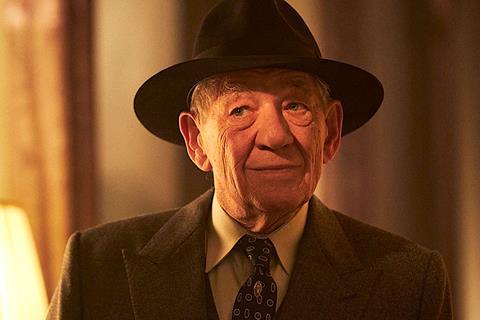Ian McKellen is a gloriously acerbic 1930s theatre critic in a film that proves too genteel for its central character

Dir: Anand Tucker. UK. 2023. 95mins
Cruelty comes in many forms in Anand Tucker’s tasteful new drama, which follows a 1930s theatre critic whose acidic reviews prove to be as noxious as his scheming. The Critic benefits from Ian McKellen’s amused performance as the title character, with Gemma Arterton equally fine as an insecure actress tired of his scathing notices. Their confrontation sends this adaptation of the Anthony Quinn novel into darker thematic terrain, examining the ways that both life and art can break people’s hearts. But the elegant tone undercuts the material’s inherent bite, ultimately defanging a picture that eventually shifts into a twisty thriller.
The excessive elegance of Tucker’s direction sands off the story’s jagged edges
The Critic screens in Toronto, and the film’s star power should attract potential buyers. Older upscale audiences may be intrigued — not to mention anyone with a fondness for narratives set in the world of theatre and newspapers. But a lack of strong reviews could ironically diminish enthusiasm, leaving The Critic only a modest theatrical prospect.
London, 1934. Jimmy (McKellen) is the influential, snobbish veteran critic at The Daily Chronicle, eviscerating live theatre that does not meet his high standards. Although he relishes crafting colourful, cutting prose, Jimmy worries that the paper’s new owner, David (Mark Strong), who has taken over from his late father, will replace him with a cheaper, nicer critic. (Also, David doesn’t approve of Jimmy’s homosexuality, which he feels runs counter to the paper’s family-friendly image.) As if Jimmy did not have enough problems, he is also accosted on the street by Nina (Arterton), an actress he loves to ridicule in his writing. To their surprise, though, they become friends — until Jimmy realises that she might be able to help him hold onto his job.
Directing his first feature since 2010’s Leap Year, Tucker presents a London in which fascism is on the rise and Jimmy fears for his livelihood and, less urgently, his life. (The growing presence of Blackshirts at a local bar gives him only brief pause, although they frighten his longtime lover Tom, played by Alfred Enoch.) The Critic’s world is in flux, and soon we will discover that all the major characters have secrets and longings — including Stephen (Ben Barnes), a married portrait artist employed by the paper who’s having an affair with Nina. (Stephen’s wife is the daughter of David, who is nursing an unrequited love of his own.) Nina, meanwhile, has admired Jimmy since she was a girl. Her career stalled, she knows she cannot advance professionally without glowing notices from him — which he finally agrees to do, for a price.
Initially The Critic, written by Patrick Marber based on the 2015 book Curtain Call, seems to be a familiar takedown of haughty critics who have grown heartless because they have lost the love for the artform they cover. But the gears of the intricate plot soon begin to turn, with Jimmy nervous about being fired after a drunken public incident involving Tom. As mean as he is in his reviews, using his position to crush fledgling theatrical productions with one swipe of his pen, he is even more fiendish in self-preservation mode, manipulating the people around him so that he gets what he wants.
McKellen’s talent for conveying arrogance and sophistication simultaneously is crucial to making Jimmy an intriguing, despicable human being. Confident that his wit will protect him from homophobes and waspish newspaper owners alike, Jimmy is devastated at the prospect of losing his enviable position at The Daily Chronicle. But the actor is steely as the character starts to strategise, playing his hand perfectly until an unexpected tragedy occurs — prompting Jimmy to behave in such a monstrous manner it shocks both himself and viewers.
Craig Armstrong’s mournful score and David Higgs’ moody cinematography lend The Critic a classy veneer, and the performances have a gracefulness that cannot be faulted. But the excessive elegance of Tucker’s direction sands off the story’s jagged edges. For a film about fascism, hypocrisy, sexual blackmail and ambition, The Critic is too stately and reserved — too enraptured by its high-gloss production values — to be a sharp, seductive commentary on power.
By maintaining a respectful distance from the material, the picture prefers tidy dramatic ironies to devastating twists and anguished revelations. The worst one could say about The Critic is something Jimmy, a self-declared arbiter of creative brilliance, would find personally offensive: the film is simply too polite and timid for a portrait of such a cutthroat man.
Production companies: Fearless Minds, BKS Studios, Seven Stories
International sales: Culmination, harry@culminationprod.com / US sales: CAA, FilmSales@CAA.com; and UTA, filmsales@unitedtalent.com
Producers: Jolyon Symonds, Bill Kenwright
Screenplay: Patrick Marber, based on the book ’Curtain Call’ by Anthony Quinn
Cinematography: David Higgs
Production design: Lucienne Suren
Editing: Beverley Mills
Music: Craig Armstrong
Main cast: Ian McKellen, Gemma Arterton, Mark Strong, Ben Barnes, Alfred Enoch, Romola Garai, Lesley Manville















![[L-R]: Amanda Villavieja, Laia Casanovas, Yasmina Praderas](https://d1nslcd7m2225b.cloudfront.net/Pictures/274x183/6/4/1/1471641_pxl_20251224_103354743_618426_crop.jpg)





